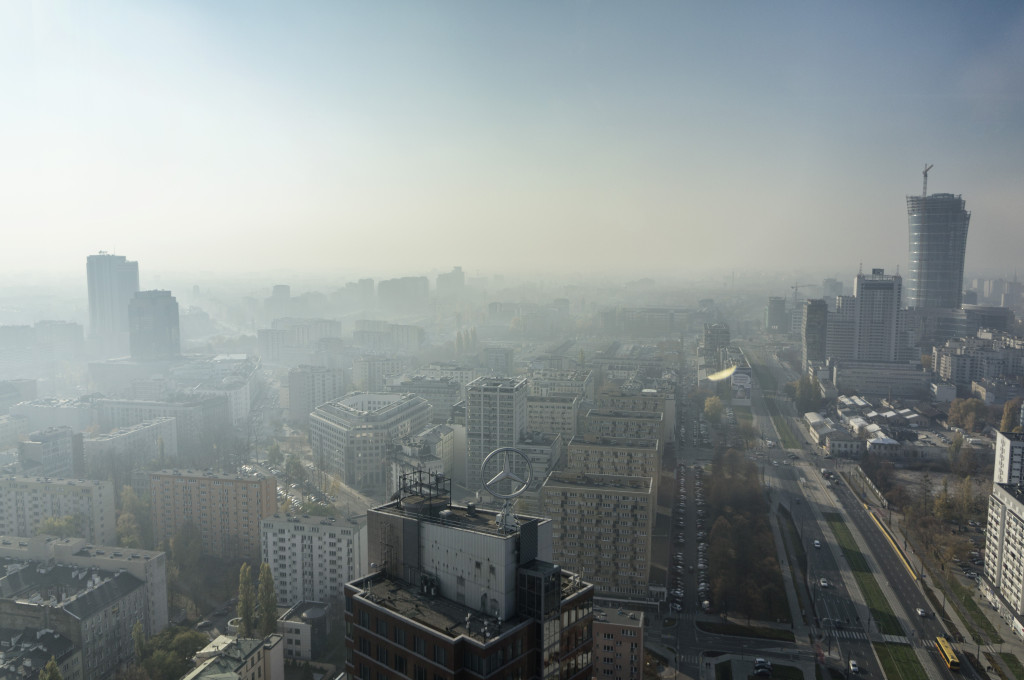Poland never boasted the cleanest air in Europe. In fact, since it started measuring its quality the levels were quite alarming and far worse than in most of the EU. However, in January 2017, pollution exceeded all acceptable (not to mention recommended) limits. Warsaw, Cracow and other major cities “competed” with New Delhi and Beijing, and were featured on the list of 10 most polluted cities in the world. For the first time ever, Polish toxic air attracted attention of the mainstream media and private TV and radio stations, which began to air information about levels of pollution just as they used to share weather forecasts. The issue could no longer be denied by the government when the Internet was flooded with pictures of smoke-choked city centers. Websites of specialized online shops started to go down after people rushed to order anti-smog masks.
Polish air pollution problem is largely the result of the country’s addiction to coal. Not only Polish electricity, but also heating are highly dependent on this fuel. No one knows it for sure, but estimated 5 million heating stoves are still in use, with around 3 million that fail to meet any emission norms. What makes matters even worse, coal flotation concentrate and lignite, the most polluting types of coal, in other EU member states reserved only for industrial facilities, are allowed on the market. In consequence, many households supply themselves with these cheapest fuels and burn them in installations that have not been modernized since the 19th century. If we add to the equation high transport emissions from congested major cities and the fact that many people still illegally burn waste (often believing it is actually an environmentally-friendly practice), the picture becomes very grim.
The initial response of the Polish government (apart from blaming their predecessors for years of inaction in this field) seemed constructive. However, now that the heating season is coming to an end, it turns out very few steps will be taken to tackle the issue and achieve desired results.
The government issued draft norms on solid fuels that (likely under pressure from the coal lobby) fail to eliminate from the market even the most polluting types of coal and its by-products. A vague promise of a national programme of thermal upgrading to boost energy efficiency of private houses was also made. Lengthy consultations of a draft regulation aimed at eliminating obsolete heating stoves from the market are coming to an end, but considering how many of these are installed and working, it would take decades until they are all replaced – and air pollution is too serious to wait that long.
An infringement case launched by the European Commission for exceeding PM10 limits is already before the Court of Justice of the European Union and will be likely concluded in 2017. In February, a group of leading NGOs submitted a complaint to the Commission for continuous breaches of benzo(a)piren limits supported by 26,000 citizens.
The Polish governments does too little, too late. Local governments could take more action, but have limited tools to tackle the problem. They are competent to locally regulate types of heating stoves and fuels on the regional level (some regions announced they would enact adequate laws in 2017), but often lack financial means or political will to launch full-scale campaigns against air pollution. At the same time, municipal governments struggle to curb increasing traffic in cities: many years of bad urban planning and insufficient investment in public transport gave rise to uncontrollable urban sprawl and constant traffic jams. Now, with no competence to impose congestion charges or temporary travel bans, local lawmakers can only promote cycling and tweak bus networks – with insufficient results. A draft bill allowing creation of low emission zones put forward by a liberal opposition party Nowoczesna (Modern) was rejected by the Polish parliament.
For a country where almost 50,000 premature deaths each year are attributed to poor air quality and the overall yearly cost of air pollution estimated by the European Environmental Agency reaches EUR 26 billion, these actions seem to be nothing but a smoke screen to hide lack of will to really solve air quality issue. In fact, protection of the environment is low on the list of priorities of the current government: right now it is logging pristine Białowieża Forest and plans a gargantuan canal project that will destroy unique ecosystem of the Vistula Spit. In consequence, it seems very unlikely that any serious actions to improve air quality will be taken. Thus, the future is bound to bring new smog episodes, probably even heavier than the ones Poland witnessed recently.



